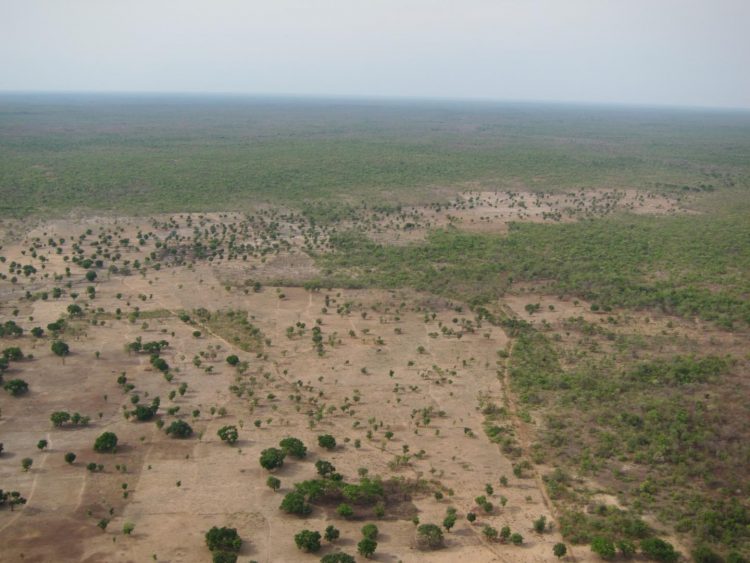Is conservation aid preventing deforestation?

This is an aerial view showing the border area of W National Park in Benin, Africa. Deforestation outside of the park is visible, with relatively better conditions within the park. Forest clearing is beginning to encroach on the park. Credit: Daniel Miller
University of Illinois's Daniel Miller, who studies international environmental politics, and two other researchers examined data from 2000 to 2013 on the rates of deforestation across 42 sub-Saharan countries.
“We find evidence that some conservation aid actually leads to a short-term increase in deforestation,” Miller says. “Our hypothesis is that it's displacement. The conservation aid may have gone toward a national park in, say, Benin, leading to less deforestation inside the park. That's the good news, but the bad news is that the funding may have just displaced forest clearing activities outside park boundaries. Our study looks at the country-size scale, so results may be capturing this displacement effect.”
Miller and his co-authors looked at a sub-set of African countries with high forest cover–countries like the Democratic Republic of Congo and Liberia–to see if dynamics were different. They found that quality of governance–rule of law, government effectiveness, whether citizens have a voice in selecting their leaders–affected the results.
“In heavily forested countries, we found that better governance on its own did not predict less deforestation,” Miller says, “but in such countries, better governance apparently allowed conservation aid to have a positive impact in reducing deforestation. It may be that good governance in countries where forests are an important natural resource helps ensure conservation and sustainable management not only in protected areas but outside them as well.”
Miller says there is already a lot of research looking at factors such as economic growth and rural population growth as deforestation drivers. A key innovation in this study is to include factors that can mitigate deforestation drivers, like conservation aid and existence of national parks and other projected areas, in the same statistical models.
“Unfortunately, the amount of aid is so little and the pressures to cut down the forest for furniture markets, firewood and building materials for homes, or other uses are so great that the conservation and money and protected areas are not enough to counteract the overall loss of forest in many countries.”
###
The study “Assessing the impact of international conservation aid on deforestation in sub-Saharan Africa” appears in Environmental Research Letters. It was written by Matthew Bare, Craig Kauffman, and Daniel C. Miller. The Gordon and Betty Moore Foundation and the MacArthur Foundation provided funding to support the research.
Media Contact
All latest news from the category: Agricultural and Forestry Science
Newest articles

First-of-its-kind study uses remote sensing to monitor plastic debris in rivers and lakes
Remote sensing creates a cost-effective solution to monitoring plastic pollution. A first-of-its-kind study from researchers at the University of Minnesota Twin Cities shows how remote sensing can help monitor and…

Laser-based artificial neuron mimics nerve cell functions at lightning speed
With a processing speed a billion times faster than nature, chip-based laser neuron could help advance AI tasks such as pattern recognition and sequence prediction. Researchers have developed a laser-based…

Optimising the processing of plastic waste
Just one look in the yellow bin reveals a colourful jumble of different types of plastic. However, the purer and more uniform plastic waste is, the easier it is to…



